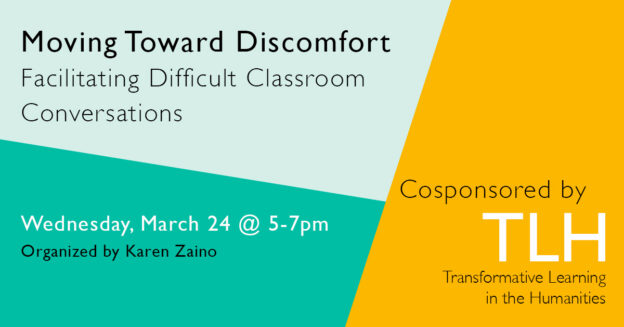This post was written by Contributing Authors Karen Zaino (Secondary Education and Youth Services, Queens College), Azreen Hasan, Emily Ram, Maria Sultana, and Ahmad Zeidieh.
During this session, which was part of Dean Dana Fusco’s Will to Change series in the Queens College School of Education, I worked with four undergraduate students to facilitate a workshop on “moving toward dis/comfort” in classroom conversations. We use the term “dis/comfort” to signal the importance of recognizing different positions and comfort levels within the classroom, where “comfort” and “discomfort” are shorthand for the affective experience of material injustice. For many students–particularly minoritized students–classrooms have long been “uncomfortable” places that dismiss, demean, or erase their ways of knowing and lived experiences. Therefore, this workshop focused on how we might critically consider the distribution of comfort in a classroom setting – who is comfortable? At whose expense? – and use a series of “talk moves” to shift the hegemonic distribution of comfort and discomfort. These moves were adapted from the recent book Classroom Talk for Social Change by Melissa Schieble, Amy Vetter, and Kahdeidra Monét Martin.
Below, the other facilitators reflect on this experience:
Azreen Hasan: I can firmly say that this has been one of the most insightful and interactive seminars I have attended (and I am not just saying that because I was a part of it!). As future educators, it is crucial that we are aware of the importance of having critical conversations in our classroom about current tensions such as race, immigration, sexual orientation, and so much more. My classmates and I were able to conduct a lesson discussing talk moves to foster conversations. Our audience members were educators, undergraduate students, student teachers, grad students, and professors, but we all had one thing in common. We all shared the common goal to encourage a deeper awareness of power and privilege, structural inequalities, and a desire to produce change. We shared our personal narratives, our experiences, and our emotions, and we gave each other hope. Although it can be difficult to navigate such conversations, it is not impossible. Through building knowledge about historical and contemporary nuances of inequality, questioning, inviting multiple perspectives, and creating a safe classroom environment, we can have meaningful and critical conversations with our students.
Emily Ram: Being a part of an event that brings educators together in Moving Towards Dis/comfort was a privilege. I’ve learned a great deal on inquiry, inclusive, action and disruptive talk moves; myself exploring the definition of, implications and examples in using inquiry talk moves. I took away time management, the power that locating instances of power and privilege in the world around us can conquer, and the success in connecting student interest to lesson planning as truly impactful. Through critically thinking about pieces from research based articles and framing what works best for our workshop, our team was able to successfully put together a two-hour seminar that not only included rich information though also received extremely positive feedback.
Maria Sultana: Conducting a seminar that revolved around Moving Towards Dis/comfort by discussing types of Talk Moves was one that I did not realize how much I needed myself. As a future educator, I understand the importance of being there for my students, creating safe environments for them, and making sure my students’ voices are heard both in and outside of the school. Our classrooms will include students of all different backgrounds, and I learned that first hand when the audience shared their stories during the seminar. If there is one thing I took away from this event, it’s that there is so much power to storytelling. While reflecting on each other’s narratives, we all gained a new insight on so many issues that are often silenced. This event has taught me to speak my truth, allow my students to do the same, and most importantly how to conduct these conversations. This event was truly an experience I won’t forget.

Ahmad Zeidieh: I had the honor to be alongside professor Zaino and my classmates to organize an inspirational event centered around Moving Toward Dis/comfort. We posed the question, “How can we foster critical conversations in our classrooms?” What I have learned from hearing the different perspectives of our diverse audience is that fostering a critical conversion in a classroom is beyond just asking close/open-ended questions; a teacher should also consider what to do prior, during, and after the questions to support critical conversations. Also, teachers should frame their teaching practices in response to the social and uneven times in which we live; meaning, to help students understand content from marginalized perspectives. Whether we are silent or we are silenced, change must come–now. We must help empower students’ voices; students must be seen, heard, supported, and affirmed in their unique identities and experiences. Most importantly, materials must be connected to their interests and to help students connect their studies to the world today.


